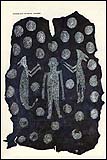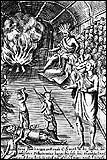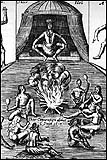.gif)
.gif)
Powhatan (d. 1618)
 |
 |

|

|
|
Village of Secoton |
Powhatan's Cloak |
Pocahontas saving |
Powhatan receiving tributes |
Powhatan was the leader, or chief, of the Powhatan federation of Indians that occupied Virginia in the early seventeenth century. At the time of settlement, Powhatan and the Pamunkeys had reduced about thirty tribes and 8,000 persons into an area of control that extended from Jamestown to the Potomac. As the English saw him, Powhatan was "a tall well proportioned man, with a sower looke" who ruled with an iron hand. Few doubt his word was law and he did hold life and death powers over his many subjects.
Despite his substantial power and authority, Smith, a keen observer, also noted that he ruled by the dictates of custom. His sub-chiefs subjected themselves willingly to his authority, likely because custom was sacred, but also just as likely because Powhatan's demands were not laid on ruthlessly. According to custom, he received an annual tribute from each of his subjects in the forms of skins, beads, copper, pearl, deer, turkeys, wild beasts, and corn.
Powhatan was understandably uneasy about the presence of the new settlers. These were not the first newcomers to the area. When Captain Christopher Newport arrived with his three ships, the Chesapeake Indians of the Cape Henry region, drove a landing party back to the ships. Curiosity turned to mistrust and fear quickly as the result of the settlers' misunderstanding of the local situation. About a week after the initial attack, Newport took a small boat up the river on a reconnoitering, get-acquainted mission, stopping at various Indian villages.
In these conversations, he learned that Powhatan ruled the whole area above Jamestown. Proving that a little knowledge can be dangerous and thinking that the Chesapeakes who had initially driven them back to the boats were not under Powhatan's dominion, Newport attempted to make an alliance against them with a local chief he mistook for Powhatan. Before the Jamestown settlers could complete their fort, 200 Paspaheghs, a tribe of the Powhatans that lived near the juncture of the James and Chickahominy rivers, attacked them, killing Eustis Clovell and wounding eleven other colonists.
During the early years of the colony, the Powhatans conducted several small-scale raids against the fort, probably to test the strength of and learn more about the invaders. In 1608 Powhatan's brother, Openchancanough, captured Captain John Smith and brought him back to Powhatan's main village, Werowocomoco. Powhatan had already become acquainted with Smith in his previous bargaining for corn and other provisions. Smith's account of his captivity places Powhatan in an adversarial role. He claims that he was tried before Powhatan and sentenced to death. According to Smith, his life was spared by the intercession of Powhatan's daughter Pocahontas. Some have disputed this account, alleging that Powhatan staged a mock trial and deliberately planned the rescue for his own purposes. Whatever Powhatan's intentions, he did permit Smith to return to Jamestown.
Despite these rocky beginnings, Powhatan did exhibit trust of the newcomers when he allowed his sons and at least one daughter (Pocahontas) to travel to and from the settlement. The English needed the Indians, especially their corn, venison, and fish, and the Indians guaranteed their survival by supplying them. Meanwhile, the settlers continued to blunder into situations that earned them the ire of the Indians. Captain Christopher Newport, for example, in a well-intentioned gesture decided to stage an elaborate coronation ceremony for Powhatan in an attempt to cement the friendship between the two groups. Powhatan was a proud and respected leader, the equivalent of an English king already.
The newcomers, unaware of Indian customs and Powhatan's high standing among his own people, added insult to injury by requesting that the coronation take place in Jamestown. Instead, Powhatan requested the ceremony be staged in his own village, where he ususally received tributes, and he announced that he would gladly accept gifts for a total of eight days. Newport, Smith and several other colonists complied with Powhatan's wishes, traveling to Werowocomoco to take part in a celebration neither party understood. One side thought it was crowning a king while the other believed it was receiving tribute from its subjects, and neither side was correct. Powhatan received the gifts sent by King James including a canopy bed and a scarlet cloak. [See Smith's account of the ceremony].
Powhatan continued to observe the English warily. His warriors harassed the colonists with small-scale attacks. Although the colonists eventually planted their own corn, they remained dependent upon the Indians to ensure that they would have enough provisions, especially in the lean winter months. Powhatan continued to trade but the terms became more contentious. In 1614, the Englishmen kidnapped his daughter Pocahontas in order to get back some of their own people taken in the attacks. The settlers offered a prisoner exchange and Powhatan complied with this request. He refused, however, to return the stolen weapons that the colonists demanded.
Powhatan admonished the governor to treat his daughter well and seemed content to allow her to remain among the English. Later that same year Pocahontas asked permission from her father to marry the colonist John Rolfe. Powhatan gave his blessing and sent his brother and two sons to witness the ceremony. For the remaining years of his life, Powhatan maintained a tenuous peace with the settlers at Jamestown. He died in April 1618 and was succeeded by his more militant brother, Opechancanough.
Powhatan proved that he could overcome most obstacles to co-existence, but there was one challenge he could not surmount. He could not alter the conviction that Englishmen were superior to Indians. So long as the heathen savage was fundamental to the English definition of an Indian, the English were the "natives," and the legacy of Jamestown continued with even worse consequences for subsequent newcomers.
Bibliography
Morgan, Edmund S. American Slavery, American Freedom: The Ordeal of Colonial
Virginia. New York: W.W. Norton and Company, 1975.
Rountree, Helen. The Powhatan Indians of Virginia: Their Traditional Culture.
Norman: University of Oklahoma Press, 1989.
Pocahontas's People: The Powhatan Indians of Virginia Through Four
Centuries. Norman: University of Oklahoma Press, 1990.
Woodward, Grace Steele. Pocahontas. Norman: University of Oklahoma Press,
1969.
|
©Crandall Shifflett |